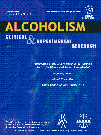Stimulatory Effect of N-Methyltyramine, a Congener of Beer, on Pancreatic Secretion in Conscious Rats
Abstract
Background: Alcoholic beverages stimulate gastric acid secretion and increase the appetite. Although ingested ethanol stimulates pancreatic secretion, alcoholic beverages contain several congeners. N-methyltyramine (NMT) was isolated from beer as a factor in stimulating gastric acid secretion. In this study, we examined NMT to determine whether the congener stimulated pancreatic secretion in conscious rats.
Methods: Cannulae were inserted into male Wistar rats to separately drain bile and pancreatic secretions: 2 duodenal cannulae, a gastric cannula, and an external jugular vein cannula. The rats were placed in modified Bollman-type restraint cages. After a 4-day recovery period, experiments were conducted on unanesthetized rats. Different concentrations of NMT (5, 25, and 50 μg/kg) solutions were infused into the stomach. To examine the mechanism, the effects of the proton pump inhibitor, cholecystokinin (CCK-BR) antagonist (YM022), CCK-AR antagonist (CR1505), and atropine were administered prior to the NMT (25 μg/kg) infusion. The effect of intravenous infusion of NMT (7.5 μg/kg) was then determined. Moreover, dispersed acini were prepared, and the effect of different concentrations of NMT on amylase release was determined.
Results: Intragastric administration of NMT significantly increased pancreatic exocrine secretion in a dose-dependent manner. Atropine eliminated the stimulatory effect of NMT, but the infusion of the proton pump inhibitor, YM022, and CR1505 did not. Intravenous infusion of NMT did not affect pancreatic secretion, and NMT did not stimulate amylase release in vitro.
Conclusions: N-methyltyramine stimulates pancreatic secretion via the cholinergic gastro-pancreatic reflex. The NMT content in beer was 2 mg/l, so that if a person weighing 60 kg consumes a 750 ml of beer, 25 μg/kg NMT will be ingested. Therefore, the stimulatory effect of beer on pancreatic secretion was produced not only by ethanol but also by the congener, NMT.




